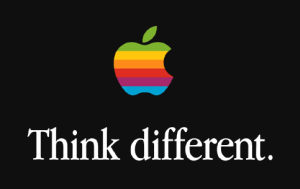Until Steve Jobs’ death in late 2011, Apple had always employed a policy of secrecy when it came to what information, about the company, they released into the outside world. This policy was pioneered by Jobs, and was a cornerstone of company policy during his time as CEO. Jobs thought that if they kept all of the details of their business model successfully hidden, then they could continue to stay ahead of the competition. The problem is that we live in the 21st century and that is not how stakeholders like to see businesses run. In a time that has seen the downfall of major corporate powerhouses like Enron and Lehman Brothers, the public has grown weary of what a businesses’ true intent actually is.
While I understand the theory behind Jobs’ policy, and agree that keeping R&D under a veil of secrecy is important, I still believe that businesses should be required to release statistical information about their business practices. We need a way to keep these companies honest and progressive. While gains are definitely being made on that front in terms of enacting more legislation, we have not seen a huge change in the situation within the past 10 years. So, while I agree that Jobs was probably the most innovative person of his time, he did not do much to show the public that Apple was a socially responsible.
So where is the company today? Well for one thing they have a brand new CEO, Tim Cook. Tim Cook replaced Jobs after Jobs passed away from pancreatic cancer in late 2011. Most Apple followers were terrified what this would mean for the company’s future, seeing as it was Jobs’ innovative vision that had brought the company so much success.
So what about this Tim Cook, what is he doing for Apple? Since Cook took the position as CEO he has already started a renovation of the company’s image. Cook, having worked as Apple’s COO before becoming CEO, was well aware of the company’s previous policy of secrecy and agreed the company needed an image makeover.
Cook has began this process by reviewing the way that the company treats its employees. Cook realized that they needed to be able to attract the best young minds in their fields in order to remain competitive and innovative. An attractive working environment will not only incentivize employees to want work for the company, but it also helps retain employees, which promotes productivity. This effort to address and take steps to make Apple a better place to work shows that Apple cares about their employees and is taking efforts to improve this relationship.
Another stakeholder Cook has reached out would be the community at large. Under Jobs’ reign Apple “didn’t do charity”. Jobs believed that, that money would be better spent on R&D. Well guess what? The public cares are community service, and admires corporations that work with charities. Cook saw this weakness as an opportunity to improve and recently announced that they will now be participating in a charity-matching program. What this means is that Apple will now match, dollar for dollar, employee donations of up to $10,000 per year. For a company that “didn’t do charity”, this seems like a pretty positive step in the right direction.
Cook has also addressed the issues with their suppliers overseas. Cook was actually the individual that was sent over to China to inspect their supplier’s factories when the controversy arose. Cook was not pleased with what he saw and hired a nonprofit auditing organization, the Fair Labor Association, to conduct regular audits of the company’s supplier’s factories. However, according to recent reports it does not appear that too much has changed on this front. There are still numerous violations found during every single audit. While, I understand that Apple does not have much authority over these matters because they do not directly control these factories, they do have a certain amount of influence over the people that do. In the future, Apple needs to take a stronger stance against supplier violations. They need to make it clear to these companies that inhuman behavior is unacceptable.
Overall, Apple appears to be moving in a positive direction under new CEO, Tim Cook, but there is still room for improvement. Cook definitely needs to do more to make sure that their Code of Ethics are actually being enforced in supplier factories, and perhaps even enforce harsher punishments for violators. I am usually not an advocate of using “punishment” as a solution, but because what these companies are doing is unethical and inhumane they need to realize that there are consequences for treating their employees poorly.
Sources:
http://www.dailyfinance.com/2012/09/14/corporate-responsibility-spotlight-apple/
http://www.cnn.com/2012/10/04/tech/innovation/apple-tim-cook
Pictures:
http://blog.laptopmag.com/tim-cook-vs-steve-jobs-new-ceo-acts-like-a-leader-but-wheres-the-magic



Do you really believe that a company needs to be transparent? If you look at companies like Goldman Sachs they are lock box. Companies also have the ability to sell assets off their balance just for a day or two in order to hide them from investors. In my mind, the whole process is a scam where so many different corners can be cut. What do you think?
That’s a really good question you pose about Apple. In my eyes it would help specifically to Apple to be transparent because so many of its shareholders were concerned about all the cash that Apple was sitting on. Furthermore because Apple is so innovative in it’s R&D many were concerned about its specific spending. While this is the case I don’t think that Apple lost many shareholders by being transparent. People believed in Jobs. While this is the case I think shareholders appreciate what Cook has done for the company since Jobs. Apple is such a unique company that its hard to gauge the longer term of effects of Cook’s actions
Reblogged this on C-Suite Mentor©.
Wow. I wasn’t aware that Cook himself went over to China. I am pleased to hear that Apple will be participating in charity work…considering they are one of the most profitable companies in the world, I am sure that they can spare $10,000. Do you think that Cook’s motivation to make changes comes out of the “goodness of his heart” or does it come from his desire to maintain company image and propel Apple’s image towards a more positive light?
Well, anyone ever heard of a “ptomekin village”? Just because Cook went (and Jobs himself, I believe, had visited) does not really mean much about actual day to day conditions.
I agree. This move appeared to really be a positive step in the right direction, although, it has not really lead to much in the way of positive change.
Apple might not have been ethical when Steve Jobs was CEO, but I am sure there was a reason people believed in Apple despite all the secrecy and, roughly said, poor CSR image. I feel, that under Steve Jobs Apple didn’t need all the charity, community service and good image, due to the simple fact that people loved the company in spite of everything. It also seems to me that Tim Cook is not exactly sure about his ability to follow Steve’s steps and keep Apple as innovative as before. Hence, charity, better labor practices, and other side measures are taken in order to compensate for the lack of innovative power.
My real question here is: What exactly do you want Apple to be transparent about?
I think that being open about SOME business practices such as major components of their supply chain and basic company breakdown is one thing, but the “culture of secrecy” that Apple is so well-known for involves their process of developing products. Take the iPhone for example: it arguably started the boom of the smartphone (and definitely the touchscreen) because it was unlike ANYTHING else around. Mere days before the announcement, people were going crazy speculating what they thought it would be like. That secrecy meant that nobody else could get anything near a solid head start competitively.
Even Google, a company known for their widespread betas and very public product design process, has begun to work under some secrecy with projects like the Google Glass.
To be honest I don’t think that Apple should be 100% transparent, but there are some areas that the public has a right to know about. These areas that I am talking about are the business practices that directly effect others outside the company, a.k.a stakeholders. Specifically, I believe that their environmental policies, community outreach policies, information regarding materials and labor practices used in manufacturing, and parts of its corporate governance structure are all areas that should be made public. Unless there was a serious absence in any of these areas, it would actually be in the best interest of the company to release this information in order to encourage investors to buy stocks and consumers to buy their products. Look at Starbucks for example. They always make an effort to keep the public informed about how they are being socially responsible and this has greatly strengthened their reputation. It is therefore not surprising that Apple does not release more information than they have to in some of these areas because they are probably concerned it would hurt their reputation instead of helping it.